

9 Ways to Use Social Media in Your Classroom. It’s overwhelming to think about packing up the summer, heading back to the classroom, and adding a new instructional strategy to your already overflowing toolbox.
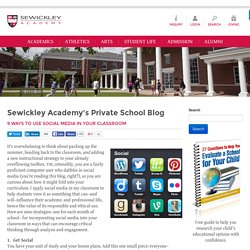
Yet, ostensibly, you are a fairly proficient computer user who dabbles in social media (you’re reading this blog, right?) , so you are curious about how it might fold into your curriculum. I apply social media in my classroom to help students view it as something that can–and will–influence their academic and professional life, hence the value of its responsible and ethical use. Here are nine strategies–one for each month of school– for incorporating social media into your classroom in ways that can encourage critical thinking through analysis and engagement. 1. 2. 3.
Other ideas are to have a class twitter account and talk to other classes such as #kinderchat or have a twitter competition with another class. 4. 5. 6. 7. How Social Media Can Help Students Study. With the right strategy, social media can make studying more collaborative and efficient.
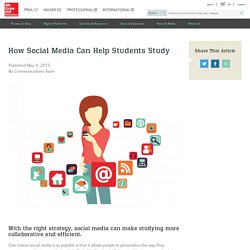
One reason social media is so popular is that it allows people to personalize the way they experience and interact with the Web. Tools like Facebook, Twitter, and Instagram used to be almost exclusively used to take a break from academics, but social media is increasingly being leveraged as a study tool, especially for today's tech-savvy students. Our recent research around college study trends found that over 70% of students feel that the technology they use to study should be as tailored to their needs as social media feeds. What Are the Best Social Media Strategies for Universities? Martin Seligman and Positive Psychology. "Use your signature strengths and virtues in the service of something much larger than you are.
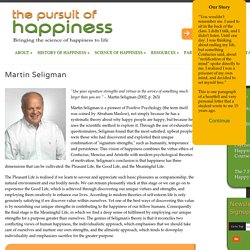
" ~ Martin Seligman (2002, p. 263) Martin Seligman is a pioneer of Positive Psychology (the term itself was coined by Abraham Maslow), not simply because he has a systematic theory about why happy people are happy, but because he uses the scientific method to explore it. Through the use of exhaustive questionnaires, Seligman found that the most satisfied, upbeat people were those who had discovered and exploited their unique combination of "signature strengths," such as humanity, temperance and persistence.
This vision of happiness combines the virtue ethics of Confucius, Mencius and Aristotle with modern psychological theories of motivation. Seligman's conclusion is that happiness has three dimensions that can be cultivated: the Pleasant Life, the Good Life, and the Meaningful Life. The very good news is there is quite a number of internal circumstances [...] under your voluntary control. Angela Lee Duckworth: Grit: The power of passion and perseverance. Level Up! Unlocking the Power of Digital Engagement in Higher Education. Motivating Adult Learners. Daphne Koller: What we're learning from online education. Ramsey Musallam: 3 rules to spark learning.
Is there a Place at the Adult Education Table for Positive Psycho. Why won’t it Stick? Positive Psychology and Positive Education. OET Draft Grit Report 2 17 13. Online learning: It's different. The number of online educational offerings has exploded in recent years, but their rapid rise has spawned a critical question: Can such "virtual" classes cut through the maze of distractions -- such as email, the Internet, and television -- that face students sitting at their computers?

The solution, Harvard researchers say, is to test students early and often. By interspersing online lectures with short tests, student mind-wandering decreased by half, note-taking tripled, and overall retention of the material improved, according to Daniel Schacter, the William R. Kenan Jr. Professor of Psychology, and Karl Szpunar, a postdoctoral fellow in psychology. Their findings are described in a paper published this week in the Proceedings of the National Academy of Sciences. Learner Support Services for Online Students: Scaffolding for success. Stacey Ludwig-hardman, Joanna C.
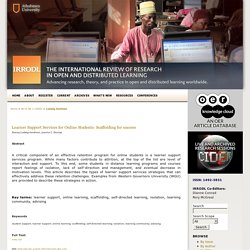
Dunlap Abstract A critical component of an effective retention program for online students is a learner support services program. IPEN – International Positive Education Network. Canadian Positive Psychology Association - Journal. IPPA. Positive Education Network. Positive Psychology Learning Public Group. What can you learn from game designers? - Happy Brain Science. I first thought that my game design background and using brain science to thrive at work had little to do with each other; wow was I wrong!
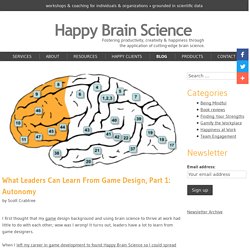
It turns out, leaders have a lot to learn from game designers. When I left my career in game development to found Happy Brain Science so I could spread the science of happiness, I figured I was leaving my game development background behind. But one of our newsletter subscribers along the way recommended I read the book Glued to Games by Scott Rigby and Richard M. Ryan. Whoever you were (maybe someone in a class at Blizzard Entertainment?)
Glued to Games connected my worlds; and it can connect your worlds too, if you’ve ever enjoyed a game, and you work with others. Autonomy at first seems straight-forward: don’t micro-manage people; provide choices. First of all, not all choices are created equally. You might be thinking “Wait, one option doesn’t deliver autonomy!” Positive Psychology / PERMA Theory (Seligman) - Learning Theories. Summary: Positive psychology is the study of happiness, flourishing, and what makes life worth living.
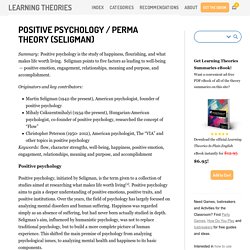
Seligman points to five factors as leading to well-being — positive emotion, engagement, relationships, meaning and purpose, and accomplishment. Originators and key contributors: Martin Seligman (1942-the present), American psychologist, founder of positive psychologyMihaly Csikszentmihalyi (1934-the present), Hungarian-American psychologist, co-founder of positive psychology, researched the concept of “Flow”Christopher Peterson (1950- 2012), American psychologist, The “VIA” and other topics in positive psychology. What is Positive Education and How To Apply It?
Is “Happy Tech” an Oxymoron? – Goodthink Inc. In recent months, I have seen a growing number of posts about how bad technology is for us.
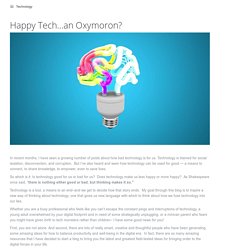
Technology is blamed for social isolation, disconnection, and corruption. But I’ve also heard and seen how technology can be used for good — a means to connect, to share knowledge, to empower, even to save lives. So which is it: Is technology good for us or bad for us? Does technology make us less happy or more happy? As Shakespeare once said, “there is nothing either good or bad, but thinking makes it so.” Technology is a tool, a means to an end–and we get to decide how that story ends. Whether you are a busy professional who feels like you can’t escape the constant pings and interruptions of technology, a young adult overwhelmed by your digital footprint and in need of some strategically unplugging, or a minivan parent who fears you might have given birth to tech monsters rather than children– I have some good news for you! Appreciative Inquiry for Online Learning: Take the Distance Out of Distance Learning. There are various names used to describe learning through a technologically enabled means and includes online learning, e-learning, and distance learning.
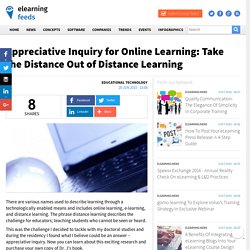
The phrase distance learning describes the challenge for educators; teaching students who cannot be seen or heard. This was the challenge I decided to tackle with my doctoral studies and during the residency I found what I believe could be an answer – appreciative inquiry. Now you can learn about this exciting research and purchase your own copy of Dr. J's book. Appreciative Inquiry and Education? The mark of education isn't the knowledge you collect in your head. It's the skills you gain about how to learn. A positive psychologist on productivity / Will you be attending the IPPA World Congress 2017? Abstract submissions are due by 30 Sept 2016. PESA: Positive Education Schools Association.